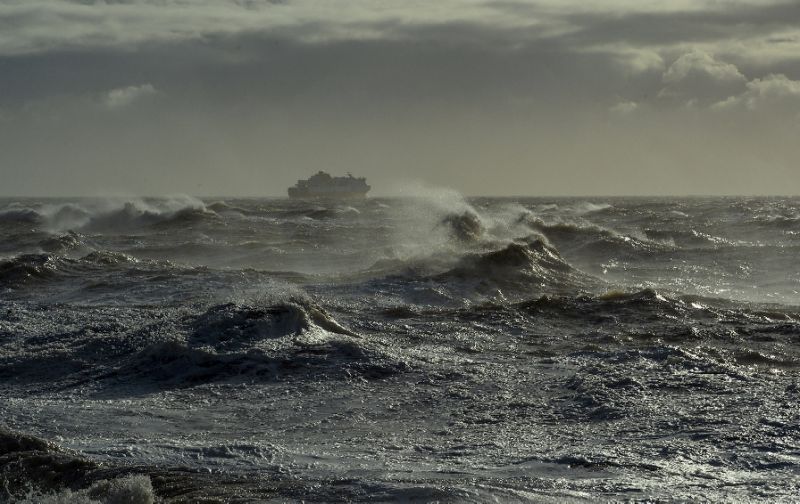Ophelia to hit Ireland
October 17, 2017 | Expert Insights

Ireland is preparing to be hit by one of the worst storms since 1961. Ex hurricane Ophelia is set to make landfall in the region on October 16th, 2017. Experts have forecast "violent and destructive gusts" of winds in wake of the storm.
Background
Ireland is an island in the North Atlantic. It is the second largest island in the British Isles and the third largest in Europe. The region of Ireland is divided into Northern Ireland (which is part of the United Kingdom) and the Republic of Ireland. Just under 4.6 million live in the Republic of Ireland and just over 1.8 million live in Northern Ireland.
The first human settlements took place around 6000 BC. The first group of civilization that left a considerable influence on Ireland was the Celtics. The Celts from Western Europe invaded Ireland between about 600 and 150 BC. It was followed by invasions by the Vikings and the Anglo-Norman Conquest. The modern version of the region came to be after the 1916 Easter Rising. It arose from the frustration arising from the continued postponement of home rule. In 1922, parts of the region (not including Northern Ireland which chose to stay with the UK), got its independence.
The climate of Ireland is mild, moist and changeable with abundant rainfall and a lack of temperature extremes. Historically, Hurricane Debbie is considered one of the worst hurricanes to hit the region. It hit in 1961 and it possibly the only tropical cyclone on record to ever strike Britain and Ireland while still tropical. It resulted in the deaths of 78 people and caused damages worth $50 million. Hurricane Charley, which hit the region in 2004, was a Category 4 hurricane. It was second major hurricane of the 2004 Atlantic hurricane season. Charley lasted from August 9 to August 15, and at its peak intensity it attained 150 mph (240 km/h) winds. It resulted in the deaths of 16 people and caused damages worth $16.3 billion.

Analysis
In the recent months, multiple devastating hurricanes have hit in the Carribean region. For a more detailed view of Hurricane Irma, Maria and Harvey, click here. These hurricanes have left multiple dead and entire towns completely destroyed. Regions like Puerto Rico have still not recovered from the devastation.
Hurricane Ophelia was a major hurricane that affected the Azores and is currently a strong extratropical cyclone. It is expected to hit the country’s west coast on Monday. Even though, by the time it makes windfall it will lose its hurricane status, it will still be a major tropical storm. Certain parts of Ireland will see wind speeds in excess of 130kmh (80mph).
The government has called for schools to be shut down and preparations are underway to counter flooding and power outages. Ireland's Taoiseach Leo Varadkar has sent defence forces to areas like Wexford, Galway and Limerick. He tweeted: "Defence forces being deployed in Red weather alert areas and on standby for further action (on Monday). Please check in with older neighbours and those who need medical care."
This is being considered the worst storm to hit the region since 1961 (Hurricane Debbie). The NHS Atlantic Ops has warned of the dangers of the hurricane. It states, “Wind speeds atop and on the windward sides of hills and mountains are often up to 30% stronger than the near-surface winds indicated in this advisory, and in some elevated locations could be even greater. A dangerous storm surge is expected to produce significant coastal flooding near and to the east of where the center makes landfall. Near the coast, the surge will be accompanied by large and destructive waves.”
Ophelia is also forecast to produce 2 to 3 inches of rain with isolated totals nearing 4 inches. The hurricane has been considered unusually strong for the region. CNN Meteorologist Allison Chinchar said “The odd part about Ophelia is seeing this intensification take place in what's normally a much cooler region of the Atlantic Ocean. Wind is going to be the biggest factor.”
A Met Éireann spokesperson said, “The tail end of hurricanes often affect Britain and Ireland, but usually, by the time they reach us they will have lost most of their power. We’ve had a very active hurricane season, but the remains of Hurricanes Maria and José passed us by harmlessly, as is usually the case. But Ophelia is unusual because hurricanes would usually come from America or the Caribbean, whereas this one is coming from the southwest, below the Azores. It’s worth noting that Hurricane Debbie also came from this unusual direction and source region.”
Experts have stated that while climate change did not cause recent hurricanes such as Harvey and Irma, it played a role in the intensity of these storms.
Assessment
Our assessment is that Ophelia is likely to leave behind widespread destruction of land and property in its wake. It is time for scientists to study why the hurricane originated from the unusual position and source region, as stated by the meteorological department. Did climate change play a role? If yes, then how can it be countered in the future?








Comments